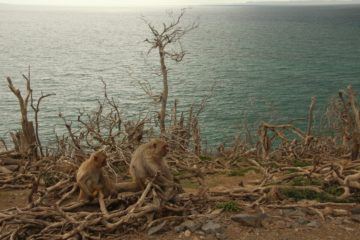Lydia Denworth in Scientific American:
 In September 2017, when Hurricane Maria hit Puerto Rico, the storm first made landfall on a small island off the main island’s eastern coast called Cayo Santiago. At the time, the fate of Cayo Santiago and its inhabitants was barely a footnote in the dramatic story of Maria, which became Puerto Rico’s worst natural disaster, killing 3,000 people and disrupting normal life for months.
In September 2017, when Hurricane Maria hit Puerto Rico, the storm first made landfall on a small island off the main island’s eastern coast called Cayo Santiago. At the time, the fate of Cayo Santiago and its inhabitants was barely a footnote in the dramatic story of Maria, which became Puerto Rico’s worst natural disaster, killing 3,000 people and disrupting normal life for months.
But more than three years on, the unfolding recovery on the tiny island has something interesting to tell us about the critical role of social connections in fostering resilience. Santiago is home to some 1,500 rhesus macaques who have been closely observed by scientists for decades. To everyone’s surprise, nearly all the monkeys survived the storm. That made their response to the devastation of Maria, which wiped out 60 percent of the island’s vegetation, an unusual natural experiment. How would they cope? How would the competition for resources—food and shade—play out? Scientists also wondered whether the trauma of having experienced the storm might make the animals strengthen their existing bonds. Would they solely rely on their closest friends, as many humans have had to do during the COVID-19 pandemic?
The monkeys reacted by changing their social order, it turned out. The macaques built broader and more tolerant social networks, according to a paper published today in Current Biology. “It’s a wholesale shift in the level of connectedness across the population,” says neuroscientist Michael Platt of the University of Pennsylvania, who is co-senior author of the study.
More here.
